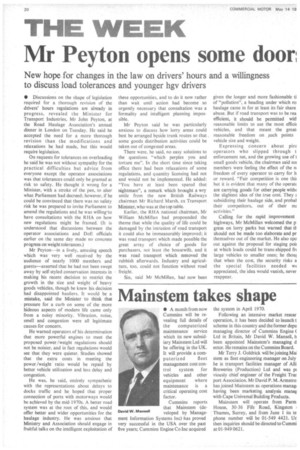THE WEEK Mr Peyton opens some door;
Page 22

If you've noticed an error in this article please click here to report it so we can fix it.
New hope for changes in the law on drivers' hours and a willingness to discuss load tolerances and younger hgv drivers
• Discussions on the shape of legislation required for a thorough revision of the drivers' hours regulations are already in progress, revealed the Minister for Transport Industries, Mr John Peyton, at the Road Haulage Association's annual dinner in London on Tuesday. He said he accepted the need for a more thorough revision than the modifications and • relaxations he had made, but this would require legislation.
On requests for tolerances on overloading he said he was not without sympathy for the practical difficulties but advice from everyone except the operator associations was that tolerances could only be granted at risk to safety. He thought it wrong for a Minister, with a stroke of the pen, to alter what Parliament had decreed; however, if he could be convinced that there was no safety risk he was prepared to invite Parliament to amend the regulations and he was willing' to have consultations with the RHA on how new regulations might be framed. (It is understood that discussions between the operator associations and DoE officials earlier on the same day made no concrete progress on weight tolerances.) Mr Peyton in a lively, amusing speech which was very well received by the audience of nearly 1000 members and guests—asserted that he had not been swept away by self-styled conservation interests in making his recent decision to restrict the growth in the size and weight of heavy goods vehicles, though he knew his decision had disappointed hauliers. it would be a mistake, said the Minister to think that pressure for a curb on some of the more hideous aspects of modern life came only from a noisy minority. Vibration, noise, smell and congestion were all legitimate causes for concern.
He warned operators of his determination that more powerful engines to meet the proposed power /weight regulations should not be noisier, and in fact regulations would see that they were quieter. Studies showed that the extra costs in meeting the power /weight ratio would be repaid by better vehicle utilization and less delay and congestion.
He was, he said, entirely sympathetic with the representations about delays to docks traffic and he hoped that proper connection of ports with motorways would be achieved by the mid-1970s. A better road system was at the root of this, and would offer better and wider opportunities for the haulage industry. He was anxious that Ministry and Association should engage in fruitful talks on the intelligent exploitation of these opportunities, and to do it now rather than wait until action had become so urgently necessary that consultation was a formality and intelligent planning impossible.
Mr Peyton said he was particularly anxious to discuss how lorry areas could best be arranged beside trunk routes so that. some goods distribution activities could be taken out of congested areas.
There were, he said, no easy solutions to the questions "which perplex you and torture me". In the short time since taking office there had been relaxations of some regulations, and quantity licensing had not and would not be implemented. He added: "You have at least been spared that nightmare", a remark which brought a wry smile from the new British Railways chairman Mr Richard Marsh, ex Transport Minister, who was at the top table.
Earlier, the RHA national chairman, Mr William McMillan had propounded the theme that while the quality of life could be damaged by the intrusion of road transport it could also be immeasurably improved; it was road transport which made possible the great array of choice of goods for purchasers, not least the housewife, and it was road transport which removed the rubbish afterwards. Industry and agriculture, too, could not function without road freight.
Sin, said Mr McMillan, had now been given the longer and more fashionable ti of "pollution", a heading under which ro haulage came in for at least its fair share abuse. But if road transport was to be rea efficient, it should be permitted witl reasonable limits to use the most effici■ vehicles, and that meant the great reasonable freedom on such points vehicle size and weight.
Expressing Concern about pirE operators who slipped through t enforcement net, and the growing use of 1 small goods vehicle, the chairman said sot members were feeling the effect of the n freedom of every operator to carry for h or reward. "Fair competition is one thit but it is evident that many of the operatt are carrying goods for other people with the slightest idea of the true cost. They subsidizing their haulage side, and probal their competitors, out of their mi activities."
Calling for the rapid improvement highways, Mr McMillan welcomed the p gress on lorry parks but warned that tt should not be made too elaborate and pr themselves out of the market. He also spc out against the proposal for staging poi] at which loads could be•trans-shipped fr■ large vehicles to smaller ones; he thoul that when the cost, the security risks a the special facilities needed wt appreciated, the idea would vanish, never reappear.




































































































